Adblock Plus and (a little) more
Resolving the ad blocking 'dilemma' – new research from HubSpot shows how · 2016-07-13 14:01 by Ben Williams
There is a growing pile of survey research out there documenting the inexorable rise in ad blocking and the supposedly dire revenue consequences to advertisers and publishers. So when the research folks over at HubSpot asked us at Adblock Plus to let them survey our customers for some new research they were doing, we just rolled our eyes – at first.
But HubSpot’s aim was on point: they wanted to break some new ground and explore the reasons why consumers block ads – and most importantly, what advertisers and marketers should do to balance users’ rights against the need to monetize content and support a free web. Now that’s more interesting.
So, we agreed to the survey if we could add a few of our own questions: we at Adblock Plus wanted to learn more how we could also help solve the dilemma – as we’ve said many times, we don’t hate all advertising, just the really of obnoxious stuff. And what the survey results showed us is that there are two “ecosystems” of online users – those who block ads and those who don’t. Solving the dilemma means finding a way to reach the ad blocking audience on their terms, as well as finding some viable alternative ways to monetize content creators. That’s good news, because between our Acceptable Ads guidelines and our Flattr Plus project, Adblock Plus is already making progress.
HubSpot’s survey included 1,055 respondents globally, with 70 percent being users of an ad blocker (not just ours) and 30 percent being non-users.
Links to the full report
If you just want to skip to the full report, you can find it here, along with an excellent summary of recommendations that HubSpot wrote for their audience of marketers.
More into slides? Here you’ll find 34 of those.
As for the survey questions, here are a few gems:
Yup, we really asked this question. Fact is, most consumers realize the web can’t be free without some commercial support. But they don’t like the flagrant abuses that advertisers and publishers have justified for themselves. Now, because of ad blockers, consumers have regained some control. So the solution to the ad blocking ‘dilemma’ is to prove to the controlling party (that’d be users btw) that you have a reasonable and consumer friendly method of commercialization.
The results prove that most consumers really are pretty reasonable! Even with ad blockers, there is still a large role for advertising to help fund web content – if done right. But it’s not the only way; there can be donations and micropayments and alternative ways to support content creators that haven’t yet been invented.
These results are good news for advertisers and publishers, and a huge vote of confidence for the Acceptable Ads guidelines that we’ve been advocating since 2011. The ecosystem of ad blocking consumers is not totally off limits to advertisers, but they will need to regain consumers’ trust. This is the entire point of Acceptable Ads – finding the best way to build a bridge across the unfortunate chasm between users and advertisers.
While some older consumers are probably lost forever, younger users are willing grant sites with reasonable advertising access to their attention and real estate on their screens.
Ahhh … the billion-dollar question. If consumers don’t want to let advertisers pay the freight, then are they willing to step up and pay for content directly? In the US, it looks like the answer is “yes,” but are users in France just shit out of luck? Well, no, not really. Two reasons: even a small group of users funding content would supplement ad dollars immeasurably – and diversifying publishers’ monetization might lead to fewer ads and less reliance on overloaded, obnoxious ones. Second, we’re all just waiting on the right solution. Imagine if you make it easy for users to fund content, and only one-tenth of our active users pledge $5 per month? That’s 10m users/devices times $5 … and that’s only a fraction of a fraction of the web. There is no one-size-fits-all solution. It’s going to take some experimentation and reasonable cooperation (that means you, IAB) to reinvent/reinvigorate the monetization model for the web. Our partnership with Flattr Plus is just one alternative approach, and we don’t even need total adoption to significantly lift publishers’ bottom line.
Nothing makes us more proud than this result. Before ad blockers became prevalent, consumers were powerless to signal their vote and fight back against abusive advertising practices. While we do get the odd piece of hate mail from disgruntled ad execs, we get our fair share of love letters too. We started out 10 years ago as a small open source experiment, and today we are helping to reshape the multi-billion dollar advertising industry. And guess what? So far it’s working out.
To conclude, we applaud HubSpot for conducting a thoughtful and meaningful survey and we hope to cooperate with other groups that want to actually solve the problem of abusive online advertising and push the web forward.

Comment [6]
Commenting is closed for this article.
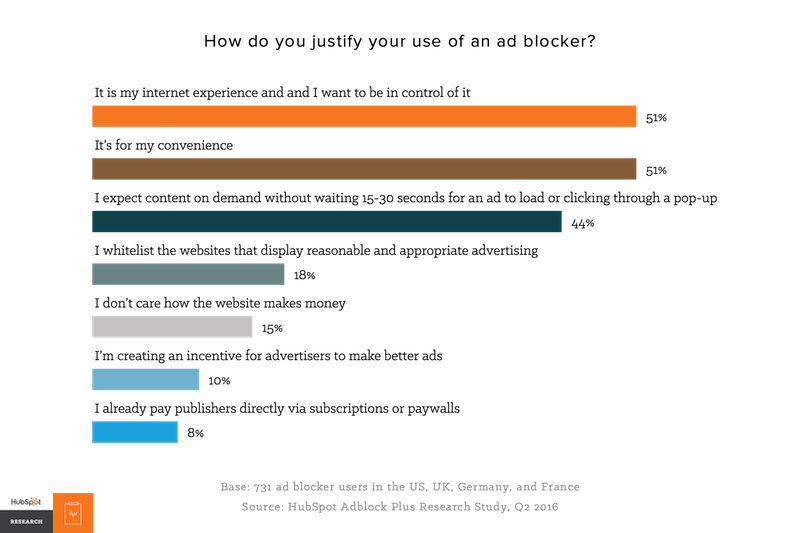
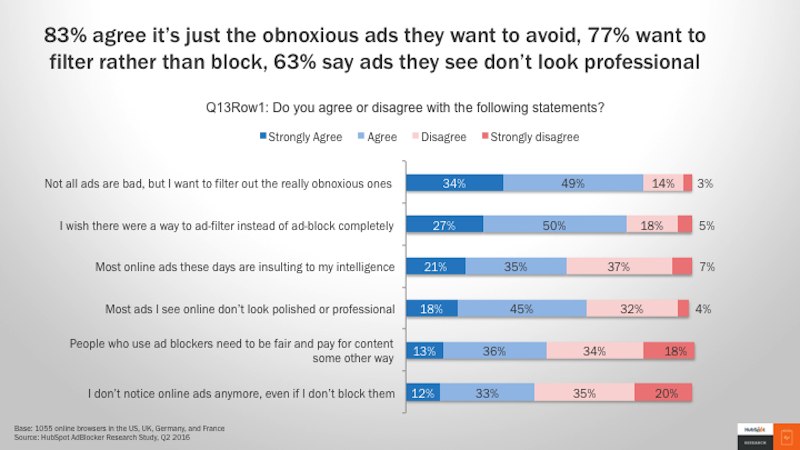
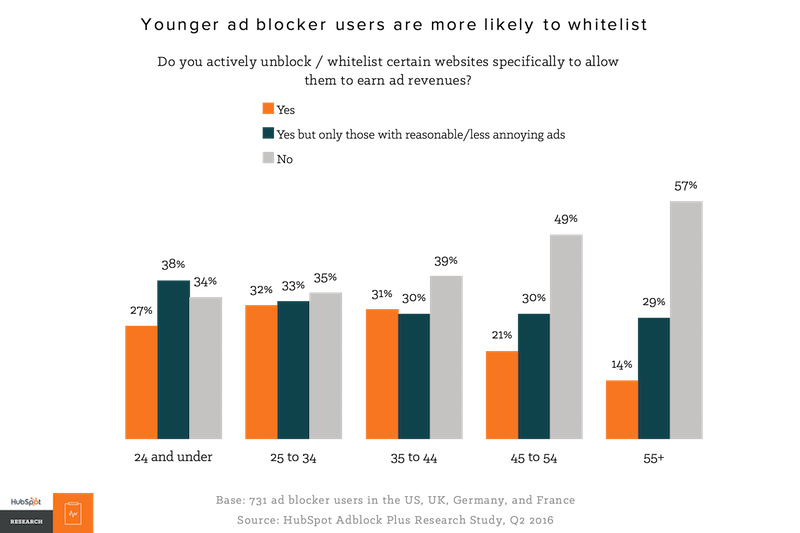
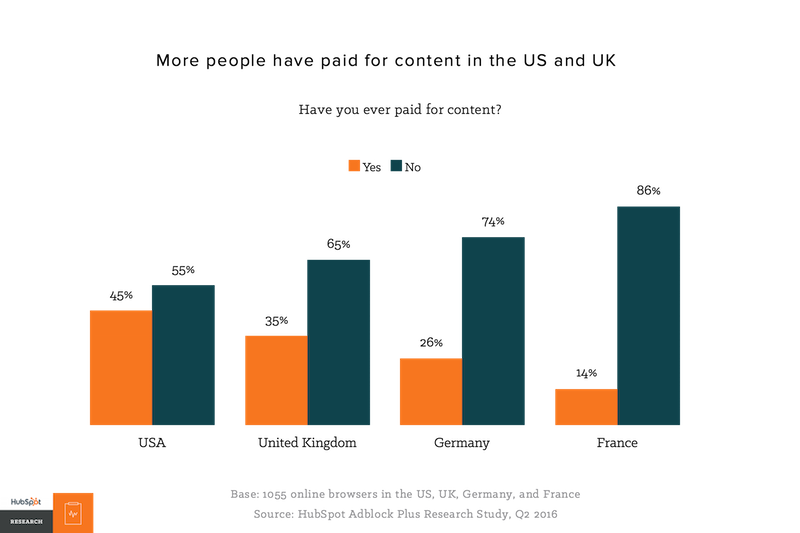
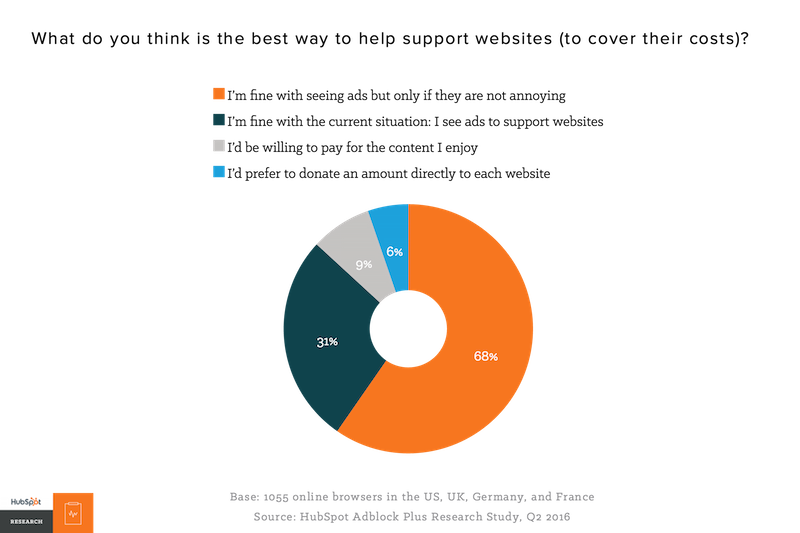
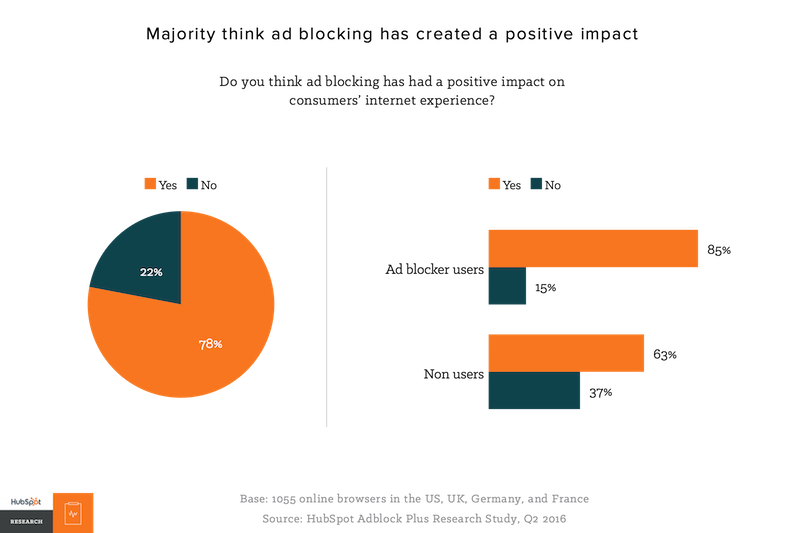
Joe Ertaba · 2016-07-13 14:15 · #
To me AdBlock Plus should not block ads for those websites that are only having a single ad block unit from some trusted ad publisher like Google for instance. It is nearly impossible to ask all website to register for being whitelisted. On the other hand, the procedure of being accepted in the whitelist is both complex and lengthy.
Reply from Ben Williams:
Hey, Thanks for the feedback.
The reason we have to ask people to whitelist is that there is no way to automatically block the intrusive ads and unblock the others. It has to be manually, which has the upside of increased quality control. The process for whitelisting starts here: https://eyeo.com/en/services and is actually pretty straightforward for small sites like you mention.
However, we are in a process of speeding up that process SIGNIFICANTLY. Stay tuned!
pierre venier · 2016-07-13 15:31 · #
merci a vous adBlock ras-le bol de c’est pub a la tv ,radio,internet c’est le pires ,j’ai pas d’argent mais si j’en avais assez je vous en donnerais ,merci pour tout .cordialement
Reply from Ben Williams:
Thanks for the support!
Ramon Morales · 2016-07-14 20:41 · #
I am in agreement with the fact that most of us, do not want ,and I quote…..“Adds on”. We want to get to our main point of view of the issue, and that is what ever we intend to see. Talk about traffic jam, so is this.
Reply from Ben Williams:
Thanks for the feedback.
Guille río meade · 2016-07-18 19:43 · #
Y eso With me i like ad Block.
Reply from Ben Williams:
Good to hear!
Ema Morvan · 2016-07-20 13:33 · #
I confess that the donations, widely used in the United States and in the field of streaming is a rather nice solution. I love I give interesting content rather than aggressive advertisements
Reply from Ben Williams:
Have you signed up to test Flattr Plus yet?
Doug Huffman · 2016-08-18 14:03 · #
In re “pay for [it] some other way:” I’m 67 y.o., on-line since we hacked our way from behind a .mil firewall in the Eighties. My earliest service providers excused their exorbitant fees as “the cost of building the Internet”, The Commons. I watched the first fiber crawl across the country towards my .edu account.
I’ve paid my due. For-fee content providers abuse the commons. The information is available unpolished and personal, as it should be.
Reply from Ben Williams:
I can’t just “like” comments, but if I could I’d like this.